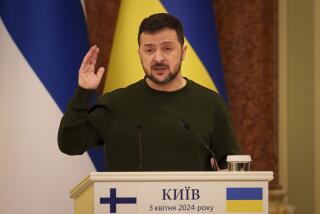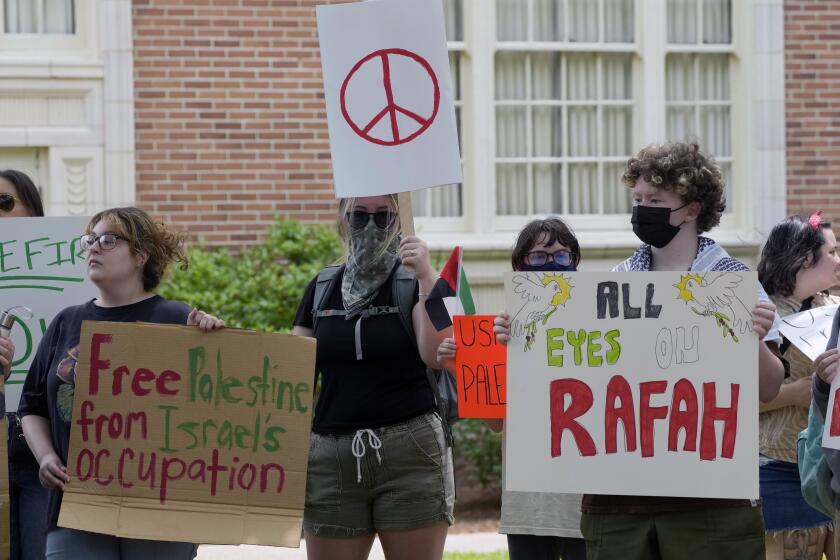Shultz ‘Damned Upset’ by Spying at Embassy : Is Determined to Go Ahead With Moscow Talks Anyway and Hints He Will Meet With Dissidents
Secretary of State George P. Shultz, who leaves Saturday for high-level talks in Moscow, said Wednesday that Soviet espionage at the U.S. Embassy in Moscow “invaded our sovereign territory and we’re damned upset about it.”
Nevertheless, Shultz said he is determined to go ahead with the trip both because it will afford a chance to make progress in arms control negotiations and because it will give him an opportunity to underline U.S. concern about Soviet human rights violations. He hinted strongly that he would meet with Soviet dissidents during the visit.
At a press conference, Shultz complained that the espionage controversy had cast a “heavy shadow” over his negotiations with Soviet Foreign Minister Eduard A. Shevardnadze, which only a month ago he had described as a good opportunity to hammer out an agreement to remove medium-range nuclear missiles from Europe.
‘Difficult Environment’
“Unfortunately, as so often is the case when we are in the midst of potentially promising discussions with the Soviets, the discussion takes place in . . . a difficult environment, generated by their actions,” he said.
Shultz angrily rejected suggestions by Soviet spokesmen that the United States might be trying to sabotage the talks by making an issue now of espionage cases that are months or even years old.
“We didn’t break into their embassy,” he said. “They broke into our embassy. They invaded our sovereign territory, and we’re damned upset about it. We’re upset at them and we’re also upset at ourselves. And we intend to do everything we can to correct our problems.”
Shultz has been bombarded with suggestions from Capitol Hill and elsewhere to cancel the trip or move it to a neutral venue like Helsinki.
Reps. Daniel A. Mica (D-Fla.) and Olympia J. Snowe (R-Me.), who visited the embassy this week, have said that Shultz will have to bring a special communications van to Moscow if he hopes to keep conversations confidential or to communicate with Washington without being overheard by Soviet listening devices. Critics have said that it would be humiliating for the secretary of state to be forced to “negotiate from a Winnebago.”
Too Important to Cancel
Shultz said he had been assured “that there will be secure communications . . . and also facilities in which we can meet in private.” He said the talks are too important to cancel and that some things he plans to do can only be done in Moscow.
“There are things that we wish to emphasize, not only in talking about them but in some of the things that we do, such as attendance at a seder in Moscow,” Shultz said. “You can’t do that if you are in some other city, and, perhaps, visiting with some other people.”
Shultz apparently intends to attend the seder, the feast held on the eve of Passover, at Spasso House, the residence of the U.S. ambassador to Moscow.
According to reports from the Soviet capital, Vladimir Slepak, who has been trying without success to obtain permission to immigrate to Israel since April 13, 1970, plans to attend the Spasso House ceremony, setting the stage for an unprecedented meeting between a U.S. secretary of state and a prominent Soviet dissident. Slepak is considered the longest standing refusenik.
May See Sakharov
There are indications that Shultz plans also to meet with Andrei Sakharov, the dissident physicist who recently was allowed to return to Moscow after years of internal exile in Gorky.
In the past, U.S. secretaries of state have urged Soviet leaders to improve their human rights record and to permit increased emigration. But none of Shultz’s predecessors ever has met openly with a dissident.
Shultz began the press conference by talking about the embassy espionage crisis, which was disclosed when two Marine guards were accused of spying after being seduced by Soviet women working for the KGB. The scandal continued to grow Wednesday, as another Marine guard was arrested on suspicion of compromising security at the U.S. consulate in Leningrad.
Shultz said he ultimately is responsible for embassy security.
‘I’m Responsible’
In their assignments, he said, the two Marines at the embassy reported to the security officer and then to the ambassador. He added: “The ambassador reports to me. So, I’m responsible. It is a clear chain of command.”
Shultz said he is determined to correct the security deficiencies--many of them going back well beyond his tenure--that made the scandal possible. He denied that the State Department had ignored warnings about security problems and had failed to protest Soviet espionage activities because of concern about adverse effects on Washington-Moscow relations.
“We will never do anything with respect to our security, or fail to do something, because we think it may cause a problem with (the Soviets),” he said.
Shultz said that the department is proceeding “full throttle” with a stepped-up security plan for the embassy, first outlined in 1985.
“It is quite obvious to everybody that you operate in Moscow in a very hostile environment, as they’re constantly trying to compromise your facilities,” he said. “That is no news to anyone . . . . However much you may realize that they are constantly trying to compromise us, the reality of it is a shock. Expected though their efforts may be, it certainly distresses me and distresses us all.”
More to Read
Start your day right
Sign up for Essential California for news, features and recommendations from the L.A. Times and beyond in your inbox six days a week.
You may occasionally receive promotional content from the Los Angeles Times.





